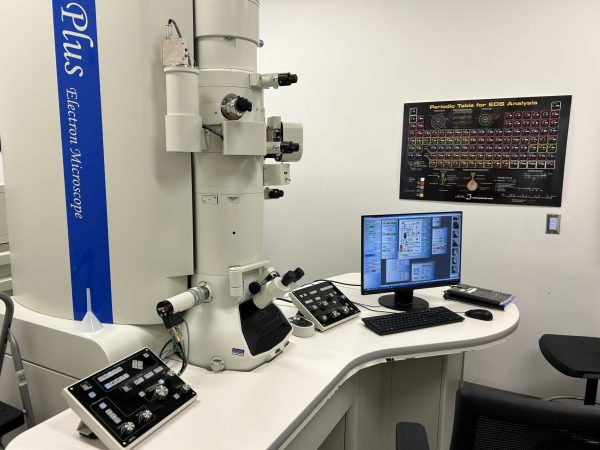Retiring Injustice
AU’s Involvement in the service workers pension problem

A Terrace Dining Room television screen features Leila Williams, the longest working employee on American University’s campus. The screen says that after 51 years of working in TDR, Williams still loves “getting up every day to feed the students, and I love it when they call me ‘Ms. Leila!’ It’s also about time for me to retire!”
What is keeping Williams from retiring isn’t her love for her job — she can’t afford it.
AARP recommends that retirees, on average, have 70-80 percent of their yearly income per expected year of retirement saved. AU math and statistics professor Mary Gray suggests that Williams would need to have $23,760 per expected year of retirement saved. She got this number by doubling the national poverty line.
Williams currently has an estimated $16,000 in her pension account.
The normal retirement age of her generation is 65 according to the Social Security Administration. Williams is 77.
Williams isn’t the only service worker with a pension problem. Fifteen other food service workers are 65 or older with 35 years or more experience working on campus. These employees cannot retire because they feel that their pensions are too small to survive on.
“To make ends meet, we have to keep working,” said Christine Hamlett-Williams, one of those workers. She’s been working at AU in the dining program for just over 35 years.
The 16 workers cannot retire because they were not receiving money in their pension fund from 1981 to 2001, according to Hamlett-Williams. These 20 years span the time AU contracted the Marriott Corporation to manage all food services on campus.
“We did not realize … that we weren’t gonna have any pension, and, from what I can understand, the university has been blaming Marriott, I guess. They’re the one that came in [1981] … and that’s when it all switched out,” Hamlett-Williams said.
Food service workers receive a pension through their current employer, Aramark, but the 20 years without pension from Marriott are preventing these 16 workers from retiring, Hamlett-Williams said. Even though AU does not directly employ these food service workers, workers and advocates like Gray want AU to get involved with the issue.
* * * *
AU started contracting companies to manage dining on campus in 1955, according to Linda Argo, assistant vice president of External Relations & Auxiliary Services at AU. That put the service workers and their benefits under the management of contracted companies.
Hamlett-Williams and the other workers thought Marriott had a pension plan. In a pension plan, employers contribute to a retirement account for employees as they work over the years. For the contract between Marriott and the union of service workers, Hamlett-Williams says no pensions were given to employees from 1981-2001.
The archived contracts between Marriott and the food service workers are currently held by Marriott and are not available for public viewing, according to an operator at the Marriott Corporation headquarters. After over 12 calls made to Marriott and multiple voicemails left, including with Leeny Oberg, chief financial officer, Marriott declined to comment by the time of publication. One contract from 1990-1993, obtained from advocate Jim McCabe, shows that Marriot made no contributions to the food service employees’ pensions.
Unite Here Local 25, the union that represented the AU food service workers in their contract negotiations with Marriott in the ‘80s, declined to comment by the time of publication.
Employees started receiving money into their pension funds again in 2001 when AU contracted Bon Appetit to take over dining services, according to Hamlett-Williams. Bon Appetit did not respond to requests for confirmation by time of publication.
In 2013, AU signed with Aramark to cover dining services. Aramark contributes $1.05 an hour, not exceeding 40 hours, to the pensions of employees who work 20 or more hours a week, according to the 2016-2019 contract between Aramark and the current union, Unite Here Local 23. A raise to $1.20 an hour will happen in May of 2019, the contract says.
“Now, 36 years here later, I’m realizing that there’s been almost 20 years with nothing going into the pension,” Hamlett-Williams said. “We thought we had something until we needed to use it. And that’s when we found out.”
* * * *
Eventually, the issue of food service workers’ pensions reached McCabe. While managing Blackboard at AU, McCabe heard about the issue from a former AU food service employee, the late Nancy Bryant-Keys, in the mid-2000s. He notified other faculty about the situation.
Professors Christopher Simpson and Gray started helping McCabe spread the word and trying to get AU involved in the issue. They noted the paradox between AU’s commitment to social justice and the mistreatment of workers happening right on campus.
“I think we owe these 16 people,” Gray said. “I think the university has a moral or ethical responsibility.”
In order to reach the suggested $23,760, Gray proposes that AU donates about $1,200 every month to each of these, making the collective monthly cost for AU just under $20,000. This is about 0.0004 percent of AU’s current monthly budget of $56 million for fiscal year 2018.
“You can come up with $20,000 a month to get these 16 people to retirement,” McCabe said. He has tried to reach out to several AU administrators to talk to them about the issue, but he says most don’t return his phone calls.
AU’s involvement in the issue is limited. “Since the University has contracted for food service operations in the 1950s, we have not been a part of any union-employer negotiations, nor are we privy to them,” Argo said.
“We’re not even allowed to be involved,” Vincent Harkins, assistant vice president of Facilities Management, said of the collective bargaining between the service workers’ union and the contracted company.
Harkins says he, and AU, can see the contract only after it has been finalized.
In October of 2015, McCabe passed out pamphlets in TDR advocating for better treatment and benefits of service workers. In alignment with a campus policy that outsiders cannot pass out literature at the private university, McCabe, no longer an employee, was arrested.
His arrest caused a large reaction from students and faculty on campus.
The Student Worker Alliance (SWA), a student club on campus said their numbers and participation in events skyrocketed after the arrest. The faculty senate produced a resolution supporting better working conditions, wages, and benefits for service workers including “appropriate remediation for retirement benefits to those workers, some with decades of service to American University.”
Now, just a little over two years later, the issue is no longer at the forefront of campus advocacy efforts. SWA only has a handful of active members, and the faculty senate has not mentioned the issue since.
McCabe, Simpson, and Gray all spoke about the importance of student involvement in the issue, but acknowledged their limitations. Students move on and graduate, but the issue remains. They noted that faculty involvement is crucial in addressing the problem.
“[We need to] get faculty to physically show unhappiness with this,” McCabe said. “Like literally show some physical disapproval for the way the university is treating these service workers.”
* * * *
Wages have been another point of concern for workers and advocates. According to Anthony Randolph, a worker representative on the advisory board of Local 23, no discussion about changes in wage has taken place. Workers like Williams currently making above the minimum wage are not sure if Aramark will increase their wage as the minimum wage increases to $15 in 2020.
“They already consider we’re making too much now,” Randolph said. In conversations with Aramark representatives, Randolph said he was told that D.C. employees already make much more than many of their other employees in other states.
When asked how wages will change, Karen Cutler, Aramark’s VP of Communications and Public Affairs, said that wages will be negotiated with the union. “Aramark is committed to treating our associates fairly, honestly and with respect,” Cutler said.
Wages are also a factor in why the 16 workers cannot retire. Because social security comes from a percentage of the hourly wage, these workers who received the minimum wage or slightly above for most of their time at AU also have little money to support them through social security, according to McCabe.
Year-long employment for AU food service workers depends on the year, Williams said. Most AU food service workers only work about nine months out of the year. Considering this and their current pension plan, McCabe estimates that their retirement pension is about six percent of their salary and that full-time university staff and faculty pensions are about 10 percent of their salary.
“Why are the lowest paid employees getting pensions 2/3 [as much as] everybody else?” McCabe said.
The answer depends on if service workers are AU workers. Because they are employed under contracted companies, AU does not oversee these workers. Advocates, however, want AU to help these service workers receive benefits similar to that of its own employees.
“AU insists that they are not AU workers. To me, it’s false on its face, the claim that these aren’t AU workers,” Simpson said. “It’s a dodge used by the administration to avoid coming to grips with the administration’s role in cheating these workers.”
Food service workers would also like to see their benefits become more like those of AU employees, according to Randolph.
“We should have the same benefits as the university workers have, that’s including the pension,” Randolph said.
One university employee benefit that has been extended to service workers in recent years is free tuition for their dependents accepted to AU. Workers and advocates are trying to have AU allow service workers to take classes for free like other AU employees, a benefit the faculty senate asked the administration to consider in their resolution following McCabe’s arrest.
Although she wouldn’t take advantage of the benefit, Hamlett-Williams wants service workers to get tuition remission.
“I don’t want to see this generation that’s here now going like this. Some of them do want to take courses and, you know, be able to stretch out from this,” Hamlett-Williams said.
According to Argo, a program is being created that would allow contract workers to take courses for free but without earning credit. The program is planned to start in fall 2018.
Yet no matter the change in benefits or wages that come in the future, 16 workers say they can’t retire.
“The university should respect, not only me, but all of us older workers that hung in here,” Hamlett-Williams said.
Some of these older workers feel like they’re getting pushed out because of their age, according to Randolph. He says this pressure comes in the form of schedule, hour, and location changes by the Aramark as well as leaving workers alone in positions that usually are multi-staffed.
“I feel like I done spent 51 years here, let me stay here until I get ready to retire. If I had the money, I would be gone,” Williams said. “Don’t just push me out.”
For Hamlett-Williams, there is a sense of abandonment.
“We’re not asking for a lot. But nobody seems to care or want to listen,” Hamlett-Williams added. “Marriott is long gone, but we’re still here.”






